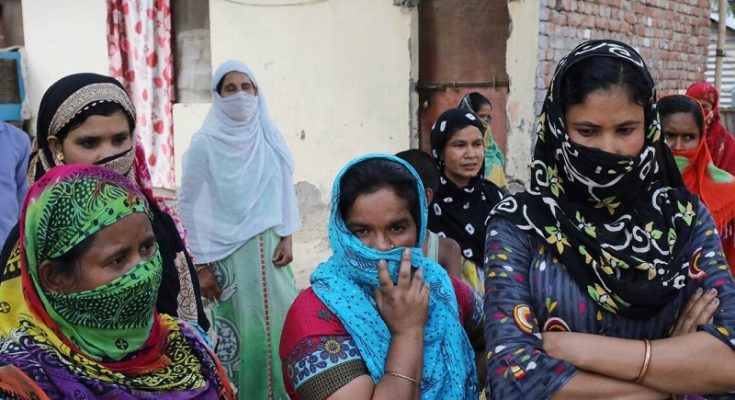By R. Suhasini
In the city of Kolkata, domestic workers appear early morning every day for work at the homes of wealthy to relatively well to do families, mainly from two areas in the city.
One is the slums of the city, which consists of more than 40 percent of the city’s population, and the other is the surrounding villages which are connected to the city through the railways.
In the slum areas of Kolkata, at least one woman from each family is a domestic worker. And those domestic workers who daily commute to the city by train, travel up to five to six hours every day.
They come to the railway stations like Canning or Krishnanagar from their remote places using a paddle van or by walk, and then travel to Jadavpur-Baghajatin or Belgharia-Sodepur by a 2 hours train ride.
They start their journey in the middle of the night, as early as 3.30 am and reach their workplace between 6.30 to 7 am, at the time when women of middle-income family households in the city wake up.
The return journey begins only after 2 or 3 pm, sometimes even later. In between these domestic workers walk from one household to another to do the necessary cleaning, washing dishes, cooking, washing clothes and whatever else they are instructed and expected to do.
Each of the workers works for 5 to 8 households. So, they are always in tremendous rush at work. Moreover, they are also rush for reaching the workplace on time or for catching the train to return home.
The most important challenge before working class movement today is the divisions that have been created within workers by the capital-state nexus.
These divisions are based on wage gap, work contract (employment status of permanent/ contractual/ casual/ trainee/ apprentice etc), domicile/ migrant status of workers, caste, gender etc.
The great majority of unorganized workers are “unorganized” simply because the work design has been changed by the capitalists.
Introduction of Taylorist model resulting in small production units and the changed definition of ‘organized work’ on the one hand, and various forms of contractualization and casualization of labour process on the other hand, has made workers more divided than ever before.
More recently in India, introduction of labour codes has brought forward various other terms like ‘fixed term employment’, NEEM trainee, gig workers etc. which are legalizing the capitalist practices of ‘hire and fire’.
Categories of work where labourers are not recognised as workers included IT-ITES, scheme-based work, domestic work, and now the workers of the new gig and platform economy. Under the new labour codes the definition of workman and their right to unionise is under rampant attack.
Earlier only few sectors like domestic workers were struggling for the recognition of their workers’ right, legal protection, right to unionise etc.
But now there are numerous other new and old categories of workers who are completely devoid of any legal rights and are in a similarly vulnerable position as the domestic workers.
The nature of domestic work in urban India
In India, a large service sector has been developed where women are getting work which is primarily care work or other such services.
Also, the huge income inequality has reasoned for precarious workers whose work is to serve the high earning but smaller in population, which broadly comprises of public sector permanent employees, the private sector manager class, or upper tier IT sector workers.
Decreasing family sizes and increasing square foot area of their residences has increased the demand for private domestic work.
Also, since the top India’s down public policy creates large incomes only for the upper echelon of the population, it is believed that these privileged few will employ the others at their private services.
Domestic workers are employed for individual employer’s private service. Therefore, one of the most important jobs for them is to understand the particular nature of that private service such as the employer’s needs and preferences or their subjective sense of good and bad, and to act accordingly.
It is not enough to be efficient but also one must tune the strings properly to the whims and vibes of the employer or the employer’s family members.
This is the reason that makes domestic workers vulnerable at their workplace and causes frequent loss of jobs. Their rights to fixed paid holidays are hard to imagine for similar reasons.
The particular kinds of challenges that a domestic worker faces at her workplace is difficult to be shared with others since she is alone at her workplace.
The only place she gets for sharing experiences with co-workers is during the travel together mostly in local trains. For local workers who travel by walk or cycle from their homes to their workplace do not even get that chance.
Even for slum dwelling workers who might be living closer to one another, because of the competitive nature of everyday life struggles in the slums (many people sharing small space, queuing up before the water tap, and using common toilets), the shared experiences at workplace hardly become a topic of discussion.
Challenges to organizing domestic workers
Our experience of working with domestic workers suggests that formation of union can take place when there can be a common basis or place for sharing. But, why a union in the first place? Can it really be formed to achieve demands from the employers? Or can it become a potential reason for job loss?
And can it be successful to raise demands to the government? These were among the many concerns that the domestic workers expressed while talking with us about the union at the initial phase.
But after few months of interactions, the workers picked up that for them the dignity of their work was the most crucial point of agreement, which would become the basis to form their own association.
Domestic workers are further unorganized among all unorganized workers. Women participating in paid domestic work hardly have been exposed to workers’ right or their own agency.
The patriarchal division of labour in family naturalize domestic work for women without recognizing its worth.
Today even after lots of movements by the domestic workers at different times in different parts of our country, in many places domestic workers are treated in the most undignified manner.
Patriarchal and classist structure within family is a major reason behind that.
Organizing domestic workers is difficult also since they hardly get time to listen, to attend regular meetings, or most importantly to think about their own rights.
The double burden of wage earning on one hand and the rush for feeding the children and male members of family on the other hand, make them cripple for any kind of political awareness.
Many of these women cannot be an independent decision maker. In many cases women cannot join the meetings because of family hindrance. Husbands often resist them from being part of an association in the initial phase.
Wage negotiation is a crucial part for unionizing domestic workers. In West Bengal domestic workers are still not enlisted under Minimum Wage Act.
Demanding a reasonable wage rate according to the today’s level of market price, is difficult for two reasons- i) workers cannot imagine of getting that price ii) it is often that the scenario of demanding proper wage may lead to job loss.
Domestic workers are large in number. One estimate suggests that there are 5 crore domestic workers all over the country.
Struggle for unionising and social recognition could change the scenario at local levels but not uniformly everywhere.
United and centralised struggle besides the local or state level struggles which are outside the NGO-state network of advocacy can lead to a more worker friendly environment for domestic workers countrywide.
(Writer is an activist and working with Domestic Workers Union, West Bengal)
Do read also:-
- Whither Contract Labour Abolition? From Rise to Repeal – A Paper By Sudha Bhardwaj
- Labour in ‘Amrit Kaal’ : A reality check
- Discovering the truth about Demonetisation, edited and censored, or buried deep?
- Class Character of a Hindu Rashtra- An analysis
- Gig Workers – Everywhere, from India to America, from delivery boys to University teachers
- May Day Special: Working masses of England continue to carry the spirit of May Day through the Year
- New India as ‘Employer Dreamland’
- Urgent need for reinventing Public Sector Undertakings
Subscribe to support Workers Unity – Click Here
(Workers can follow Unity’s Facebook, Twitter and YouTube. Click here to subscribe to the Telegram channel. Download the app for easy and direct reading on mobile.)



